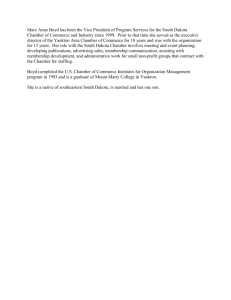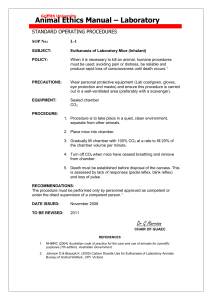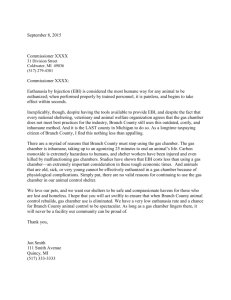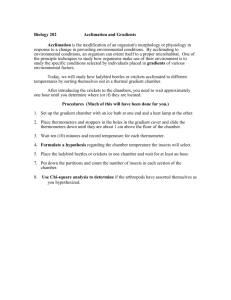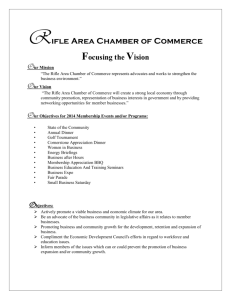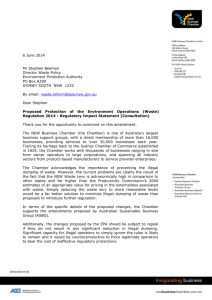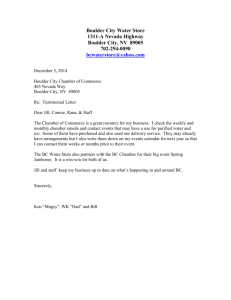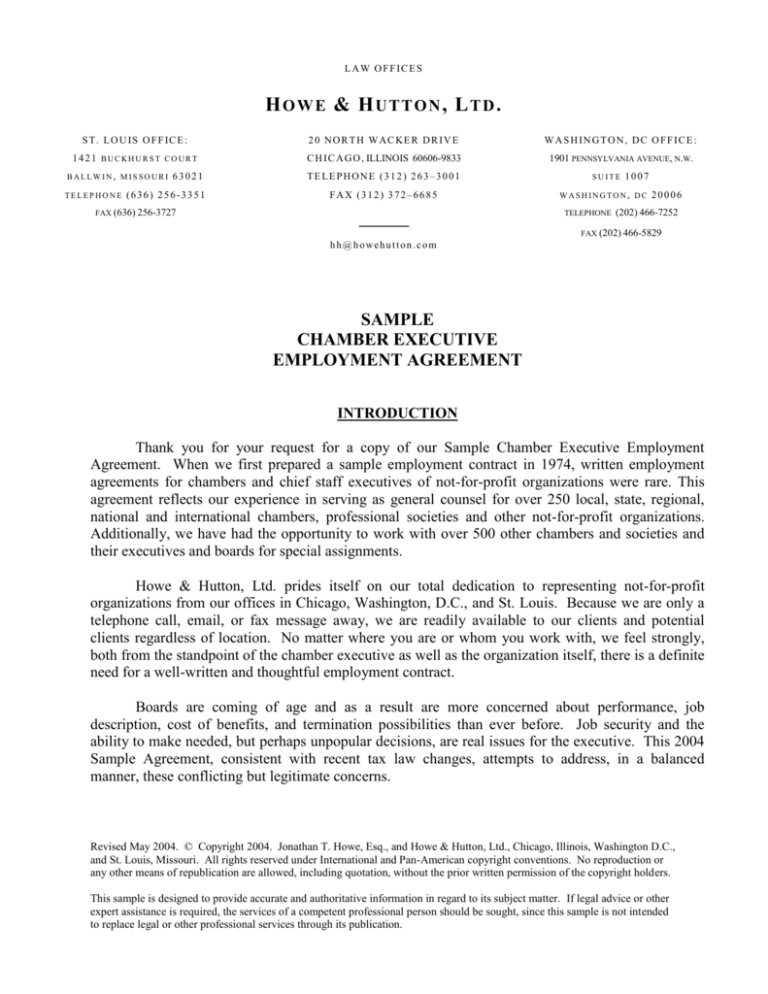
L A W O F F IC E S
HOWE & HUTTON, LTD.
S T . L O U IS O F F IC E :
2 0 N O R T H W AC KE R D R IV E
W A S H IN G T O N , D C O F F IC E :
1421 BUCKHURST COURT
C H IC A G O , ILLINOIS 60606-9833
1901 PENNSYLVANIA AVENUE, N.W.
BALLWIN, MISSOURI
TELEPHONE
63021
(636) 256-3351
FAX (636) 256-3727
TELEPHONE (312) 263–3001
FAX (312) 372–6685
SUITE
WASHINGTON, DC
TELEPHONE
__________
1007
20006
(202) 466-7252
FAX (202) 466-5829
hh@howehutton.com
SAMPLE
CHAMBER EXECUTIVE
EMPLOYMENT AGREEMENT
INTRODUCTION
Thank you for your request for a copy of our Sample Chamber Executive Employment
Agreement. When we first prepared a sample employment contract in 1974, written employment
agreements for chambers and chief staff executives of not-for-profit organizations were rare. This
agreement reflects our experience in serving as general counsel for over 250 local, state, regional,
national and international chambers, professional societies and other not-for-profit organizations.
Additionally, we have had the opportunity to work with over 500 other chambers and societies and
their executives and boards for special assignments.
Howe & Hutton, Ltd. prides itself on our total dedication to representing not-for-profit
organizations from our offices in Chicago, Washington, D.C., and St. Louis. Because we are only a
telephone call, email, or fax message away, we are readily available to our clients and potential
clients regardless of location. No matter where you are or whom you work with, we feel strongly,
both from the standpoint of the chamber executive as well as the organization itself, there is a definite
need for a well-written and thoughtful employment contract.
Boards are coming of age and as a result are more concerned about performance, job
description, cost of benefits, and termination possibilities than ever before. Job security and the
ability to make needed, but perhaps unpopular decisions, are real issues for the executive. This 2004
Sample Agreement, consistent with recent tax law changes, attempts to address, in a balanced
manner, these conflicting but legitimate concerns.
Revised May 2004. © Copyright 2004. Jonathan T. Howe, Esq., and Howe & Hutton, Ltd., Chicago, Illinois, Washington D.C.,
and St. Louis, Missouri. All rights reserved under International and Pan-American copyright conventions. No reproduction or
any other means of republication are allowed, including quotation, without the prior written permission of the copyright holders.
This sample is designed to provide accurate and authoritative information in regard to its subject matter. If legal advice or other
expert assistance is required, the services of a competent professional person should be sought, since this sample is not intended
to replace legal or other professional services through its publication.
This Sample Agreement is exactly that — a sample. No single agreement or form is
satisfactory for all applications. However, it does reflect many of the common benefits afforded to
chamber executives in today's economic climate.
SOME WORDS ABOUT INCOME TAXATION
Most of the "fringe" benefits described in this Sample Agreement have federal, and in some
cases, appropriate, state and local income tax consequences. It is a principle under federal tax laws
that "gross income" is to include all income regardless of source unless it is specifically excluded.
"Gross income" even includes employee benefits, the cost of which, if not paid by the employer,
would be borne by the employee. The tax laws do specify a number of benefits that are tax-free (e.g.,
group term life insurance up to $50,000 and health and medical plans) or tax-deferred (e.g., qualified
retirement contributions and non-qualified deferred compensation, if structured properly), but they
are certainly subject to change, as we‘ve seen in recent years.
In order to exclude such benefits from income, an employer often has to make the benefit
available to lower paid employees as well as executives. These are referred to as "nondiscrimination"
rules because they prohibit favoritism for highly paid employees.
With the Tax Reform Act of 1986, Congress attempted to strengthen and make uniform the
nondiscrimination rules for a number of non-retirement benefits such as group term life insurance and
health benefits.
In 1993, additional changes were made as to the treatment of "spouse" expenses, caps on
qualified retirement plan benefits and other issues.
Many benefits are excluded from income if they are provided as a "plan" meeting
nondiscrimination rules for the benefit of employees. An individual employment contract is not such
a plan. Some of the contract benefits, as a result, may be taxable income to the executive. An
increased compensation level may be negotiated to compensate for the executive’s tax cost. Tax
consequences, however, should not be the primary objective in negotiating such benefits. From the
executive’s point of view, it is better to have a benefit and be taxed on it than to not have it at all.
Retirement plans and deferred compensation are another highly technical area, particularly
with respect to tax-exempt organizations. They are generally of two types: "qualified" or "nonqualified."
A qualified plan allows current deductions for employer contributions (not especially
beneficial for a tax-exempt organization), tax-free investment growth, special protection from
creditors, and deferred taxation to employees until benefits are received. There are a myriad of
technical rules a qualified plan must meet, including nondiscrimination rules, minimum vesting
(nonforfeiture) of benefits, participation and coverage requirements and contribution limits.
Many tax-exempt employers do not offer qualified plans because of their complexity.
Instead, the executive enters into a non-qualified deferred compensation agreement. In addition,
especially in light of last year’s tax law changes, executives often can enter into non-qualified
533578628
deferred compensation arrangements to supplement their qualified plan retirement savings. Under a
non-qualified deferred compensation agreement, the executive defers receipt of income to defer
taxation on that income. To do this, the executive must be subject to real possible non-receipt of the
deferred income, i.e., a “substantial risk of forfeiture,” or the arrangement must conform to specified
tax rules (i.e., be an “eligible deferred compensation plan” under Internal Revenue Code (IRC)
Section 457(b)) which include a dollar limitation on the amount that can be deferred, whether or not
the deferral is elective.
Simply making the deferred income subject to the claims of the exempt organization’s general
creditors if the employer becomes insolvent, or including certain "bad boy" provisions in the event of
termination of the executive for cause, will not constitute a “substantial risk of forfeiture.” Even a
covenant not to compete or to provide consulting services may not constitute a substantial risk of
forfeiture under the circumstances of the executive in question.
Legislation enacted in 2001 made changes to IRC Sections 401(k), 403(b) and 457(b) plans,
as well as to IRA limits, ratcheting up the contribution limits annually from 2002 through 2006.
There were also new provisions for individuals over age 50 who will be permitted to make “catchup” contributions to their IRAs and employer-sponsored retirement savings plans (401(k) and 403(b)
plans, but not 457(b) plans except for governmental programs), starting in 2002. Elective
contribution limits have changed each year since 2001 and are scheduled to continue to do so through
2006. For 2004, the maximum elective contribution is $13,000, plus an additional $3,000 for those at
least 50 years of age, i.e., $16,000 in total for a chamber executive at least 50 years old. Those dollar
limits continue to increase by $1,000 each year through 2006, so that in 2006 the maximum elective
contribution is $15,000, plus an additional $5,000 for those at least 50 years of age, i.e., $20,000.
Section 457 of the IRC generally limits the amount an employee of a tax-exempt employer
may defer without incurring a substantial risk of forfeiture. Most importantly for highly compensated
chamber executives, beginning in 2002 (1) maximum contributions to non-qualified 457(b)/eligible
deferred compensation plans ($8,500 in 2001) are increased to the above limits, except for the age 50
or over catch up allowance and (2) maximum available 457(b) contributions are no longer
reduced by elective contributions to qualified plans, such as to a 401(k) plan. Thus, in 2004 a
50-year-old chamber executive can make a $16,000 elective contribution to the chamber’s 401(k)
plan and have $13,000 deferred into a non-qualified 457(b) eligible deferred compensation plan. (In
2006, scheduled increases would allow both a $20,000 elective contribution to a 401(k) plan and a
$15,000 contribution to a 457(b) nonqualified plan.) If a greater amount of non-qualified deferral is
desired, other arrangements may be made, but would typically require a “substantial risk of
forfeiture” to defer taxation. Note, however, that the chamber could also make non-elective qualified
plan contributions without interfering with these elective limitations, although other qualified plan
limitations may come into play.
To ensure the earmarking of the benefit of non-qualified deferred compensation and its related
funds, a trust (commonly called a "Rabbi Trust") should be considered. With such a trust, the
employer contributes funds to a trustee. The trustee, by the terms of the trust, is obligated to provide
the benefit to the executive unless the employer chamber is insolvent. In the unlikely event that
occurs, the funds are held for the benefit of the organization's general creditors, including the
executive.
533578628
Compensation and estate planning are more complicated than ever, so employment contracts,
benefit plans, and whether maximum utilization is being made of available employee fringe benefits
and qualified retirement and non-qualified deferred compensation plans should be reviewed annually.
USE OF THIS SAMPLE AGREEMENT
As with any legal document, competent legal and tax advice should be sought in advance to
protect the interests of all of the parties. Employment agreements, in particular, are extremely detailoriented and encompass a wide range of terms and obligations. A well-drafted, comprehensive
agreement that is responsive to the current flux in the tax laws will further a chamber’s and its
executive’s security, both as employer and employee.
Howe & Hutton, Ltd.’s tax and employee benefit attorneys would be pleased to be of service
in advising on the tax consequences of any particular benefit or employment agreement, and would
be pleased also to assist in the drafting of any employment contract.
This Sample Agreement, as is this preface, is copyrighted. If you desire to make additional
copies for distribution or to use all or any portions of it, we request that you obtain our consent before
doing so.
If we can be of any further service to you, your chamber or society, please contact us.
533578628
SAMPLE
CHAMBER EXECUTIVE
EMPLOYMENT AGREEMENT
AGREEMENT entered into this
day of
, 200_, by and between
______________________ ("EXECUTIVE") and ___________________________________
("CHAMBER"), a(n) ______________________ not-for-profit corporation.
IT IS AGREED:
1.
Employment Term - CHAMBER hires and retains EXECUTIVE for the term
beginning _________________________, 200__ through ______________, 200__ as (title)
_______________________ of CHAMBER. [See Other Optional Clauses at end of Sample.]
2.
Duties and Responsibilities - EXECUTIVE shall perform the duties and
responsibilities of _____________ in accordance with CHAMBER Bylaws, rules and
regulations and shall provide executive management services for CHAMBER as set forth in the
job description attached to this Agreement as Exhibit A, and any amendments made in
accordance with Section 9 of this Agreement. [Note: The job description should include goals
to be achieved, and afford the basis for a performance evaluation. See Section 9.]
EXECUTIVE shall perform such other duties and services as may be entrusted to
EXECUTIVE by CHAMBER in accordance with its Bylaws and consistent with
EXECUTIVE's office in CHAMBER and the terms of this Agreement. During the term of this
Agreement, EXECUTIVE shall be the Chief Executive Officer of CHAMBER, and
EXECUTIVE shall report and be responsible to the chief elected officer (Chairman of the
Board) of CHAMBER.
In addition, EXECUTIVE, as part of EXECUTIVE's responsibilities and consistent
with this Agreement at no additional compensation, shall:
2.1
Have full and exclusive authority to hire, compensate and
terminate CHAMBER staff within the approved budget of CHAMBER and to
establish the job descriptions, duties and responsibilities of all staff in accordance
with policies as may be established by the Board of Directors.
2.2
In consultation with the Executive Committee, retain legal counsel,
public relations counsel, and other consultants for CHAMBER.
Revised May 2004. © Copyright 2004. Jonathan T. Howe, Esq., and Howe & Hutton, Ltd., Chicago, Illinois, Washington D.C.,
and St. Louis, Missouri. All rights reserved under International and Pan-American copyright conventions. No reproduction or
any other means of republication are allowed, including quotation, without the prior written permission of the copyright holders.
This sample is designed to provide accurate and authoritative information in regard to its subject matter. If legal advice or other
expert assistance is required, the services of a competent professional person should be sought, since this sample is not intended
to replace legal or other professional services through its publication.
2.3
Recommend to the Board of Directors for its approval the selection
of outside certified public accountants for CHAMBER.
2.4
Have the right to prior notice of and to be present at all meetings of
the Board of Directors and Executive Committee of CHAMBER, except as
otherwise provided in this Agreement or by CHAMBER policy.
2.5
Be provided by CHAMBER with a private office, secretarial and
administrative assistance and such other personnel, facilities and equipment,
consistent with EXECUTIVE’s position and adequate for the performance of
EXECUTIVE’s duties as required under this Agreement.
2.6
If requested and agreed with no additional compensation, serve as
the plan administrator (trustee or other fiduciary), as defined under the Employee
Retirement Income Security Act of 1974 ("ERISA"), as amended, with respect to
CHAMBER’s employee benefit programs, or as an officer, director, trustee, or
delegate or representative to other chambers, organizations, corporations, or third
party groups.
[2.7
(Other items as may be appropriate.)]
3.
Compensation - EXECUTIVE shall be paid as compensation an annual salary of
$___________________ in ____ equal installments. This salary may be increased in accordance
with action of CHAMBER as provided in this Agreement. The CHAMBER Executive
Committee, based upon a formal evaluation process, shall review executive annually.
EXECUTIVE shall be eligible for an achievable performance-based bonus, based upon
mutually agreed upon goals established by the CHAMBER Executive Committee and the
EXECUTIVE. [See Other Optional Clauses at end of Sample.]
4.
Other Activities - During the term of this Agreement, except as otherwise agreed
to by EXECUTIVE and the CHAMBER Executive Committee, EXECUTIVE shall not work
for or with or accept or otherwise receive any compensation or other consideration from any
other organization, firm, chamber, society, person, corporation, or otherwise, for services to be
performed or performed by EXECUTIVE.
However, EXECUTIVE may serve, for
compensation or other consideration, as a lecturer or consultant to others, or engage in other
activities of short duration which do not otherwise interfere with EXECUTIVE’s ability to
perform or conflict with his/her responsibilities under this Agreement. In all such cases,
EXECUTIVE shall inform the chief elected officer of CHAMBER before undertaking such
activities.
5.
Insurance 5.1
Life Insurance -
5.1.1 Term Life Insurance - CHAMBER shall provide
and pay [a portion of] the premium for $___________ face amount
533578628
term life insurance, convertible and renewable, on the life of
EXECUTIVE, [and $
face amount on the life of
EXECUTIVE’s spouse and each child of EXECUTIVE,] with
EXECUTIVE having the right to designate the beneficiary or
beneficiaries. [NOTE: Up to $50,000 of Group Term Life
Insurance may be provided tax free if pursuant to a plan which does
not discriminate in favor of key employees. It may be desirable to go
beyond the tax-free amount of $50,000 for the executive and $2,000
per dependent to obtain low cost insurance. Consult your tax and
insurance advisors.]
5.1.2 Ordinary Life/Split Dollar Insurance - CHAMBER
shall provide and pay in accordance with a separate agreement a
portion of the premium on $
face amount whole life
insurance plus double/( ) indemnity on the life of EXECUTIVE.
Such premiums shall be paid by CHAMBER so as to afford split
dollar benefits to the parties, with CHAMBER being a partial
beneficiary under the policy, and EXECUTIVE having the right to
designate the beneficiary or beneficiaries for the remainder of the
proceeds of the policy. [NOTE: This is generally a taxable benefit,
at least in part; split-dollar arrangements require careful
professional attention and are potentially much less tax beneficial
given recent IRS pronouncements regarding them.]
5.1.3 "Key Man" Insurance - In recognition of the unique
responsibilities and expertise of EXECUTIVE, CHAMBER shall,
at its own expense, secure and maintain "key man" insurance on
the life of EXECUTIVE in such amount as CHAMBER deems
necessary or appropriate.
5.2
Disability - CHAMBER shall provide and pay the premium for a
long-term disability insurance policy providing for coverage to age
at the rate
of
percent of EXECUTIVE’s salary at the time of disability after the
day
of disability as defined in the policy. In the event EXECUTIVE is receiving
salary or other compensation from CHAMBER, EXECUTIVE shall reimburse
CHAMBER for the amount of disability benefits received by EXECUTIVE
during such time, but such reimbursement shall not exceed the amount received
by EXECUTIVE from CHAMBER. [NOTE: The face amount typically must be
adjusted each year as the executive’s salary changes, and the cost increases with
a higher salary and increasing age each year. If the executive pays the premium
instead of the chamber, the executive will avoid income taxation on the payment of
any benefits for a disability claim. If the chamber pays the premium, any benefits
are subject to income taxation. When the executive pays the premium, the chamber
may offer a higher compensation level to offset the cost of the premiums. In all such
cases, you should consult your tax advisor.]
533578628
5.3
Hospital, Health and Medical - CHAMBER shall provide and pay
the premium for hospitalization and major medical insurance or other hospital,
health and medical coverage as is provided other full-time employees of
CHAMBER for EXECUTIVE and the members of EXECUTIVE’s immediate
family.
5.4
Accidental Death and Dismemberment - CHAMBER shall
provide and pay the premium for $
basic face amount insurance for the
accidental death or dismemberment of EXECUTIVE, with 24 hours a day
coverage.
5.5
Other Insurance - CHAMBER shall provide and pay the premium
for such other insurance coverage, including but not limited to dental,
orthodonture, psychiatric, vision, medical counseling and other similar coverage,
as selected by EXECUTIVE, at a total annual premium rate for all such optional
coverage not to exceed $
.
6.
Retirement - [NOTE: One, none or more of these could apply.]
6.1
Qualified Plan - During the term of this Agreement, CHAMBER
shall make such contributions as are required on behalf of EXECUTIVE to the
CHAMBER Retirement Plan, which is treated as a qualified plan by the Internal
Revenue Service, and the rights of EXECUTIVE under such a plan shall be
governed by its terms. [NOTE: There are several forms of qualified retirement
plans. In each case, the chamber should specify, by description, the plan. This
may be a defined benefit pension plan, or discretionary profit-sharing plan, or
some other type of plan.]
6.2
Cash or Deferred Arrangement - Section 401(k) Plan CHAMBER has a cash or deferred arrangement consistent with the requirements
of Section 401(k) of the Internal Revenue Code of 1986, as amended. The terms
and conditions of that plan shall govern it without reference to this Agreement.
[NOTE: Limits on contributions are imposed.]
6.3
SEP - CHAMBER shall make all such payments as may be
required on behalf of EXECUTIVE to a Simplified Employee Pension Plan as
may be authorized and conducted by CHAMBER in accordance with applicable
provisions of such plan and of the Internal Revenue Code and in accordance with
such terms as may be approved by the Board of Directors of CHAMBER.
[NOTE: This may be an attractive alternative for the small chamber. Consult
your tax advisor.]
6.4
Deferred Compensation - CHAMBER and EXECUTIVE shall
enter into a supplementary employment agreement simultaneously with the
execution of this Agreement to provide for certain deferred compensation benefits
for EXECUTIVE. The terms and conditions of that agreement alone shall
533578628
govern it. [NOTE: Such compensation must be deferred before it is earned. The
tax advantages of "eligible" unfunded deferred compensation agreements are
governed and limited under Section 457 of the Internal Revenue Code.
"Ineligible" plans may also be utilized, but there must be a substantial risk of
forfeiture, i.e., possible loss of all benefits, to avoid current taxation. Be sure to
consult your tax advisor.]
6.5
Other Retirement Benefits - If this Agreement is terminated by the
mutually agreed upon retirement of EXECUTIVE at the age of
or as
otherwise agreed to by the parties, CHAMBER shall provide to EXECUTIVE
the following: [NOTE: This could include continued health coverage, annuity,
etc., to the extent such benefits or insurance coverage are obtainable. The Age
Discrimination in Employment Act bans any discrimination based on age as to
such benefits. Consult your legal advisor.]
7.
Expense Reimbursement -
7.1
In General - CHAMBER shall pay or reimburse EXECUTIVE
for all ordinary and necessary expenses incurred by EXECUTIVE in the
performance of EXECUTIVE’s duties under this Agreement and in accordance
with the policies of and budget approved by CHAMBER.
7.2
Professional Chamber Dues and Expenses - CHAMBER shall pay
or reimburse EXECUTIVE for appropriate professional chamber dues and fees
as may be approved by the Executive Committee of CHAMBER. In addition,
EXECUTIVE shall be reimbursed for all ordinary and necessary expenses
incurred by EXECUTIVE in attending or otherwise participating in the programs
of such organizations, within the budget approved by CHAMBER.
7.3
Spouse Expenses - The Executive Committee of CHAMBER, as a
condition of EXECUTIVE’s continued employment with CHAMBER, shall
periodically designate those meetings and activities for which it deems it
necessary, from a business point of view, for EXECUTIVE’s spouse to attend.
In all such cases, CHAMBER shall pay or reimburse all ordinary and necessary
expenses incurred by EXECUTIVE’s spouse to attend such meetings and
activities. [NOTE: Such expenses are generally considered taxable income to the
executive, with very few exceptions.]
7.4
Automobile Entitlement - In light of the unique nature of the
professional duties of EXECUTIVE, CHAMBER shall provide EXECUTIVE
with an automobile lease (not to exceed $______ per month) for business use as
required under this Agreement. CHAMBER shall insure or otherwise hold
harmless EXECUTIVE against all liability that results or may result from the use
of the automobile. EXECUTIVE shall be responsible for undertaking reasonable
precautions to prevent the loss, theft or destruction of the automobile, including
its garaging, the expense of which, however, shall be paid by CHAMBER. The
533578628
CHAMBER shall pay for insurance, gasoline, maintenance and operation of the
vehicle. [NOTE: Nontaxable monthly parking expenses are capped by the IRS.
Some chambers provide a monthly cash allowance instead. Auto leases and
monthly auto allowances are generally considered taxable income to the
executive unless business use is properly substantiated. Personal use invariably
results in taxable income.]
7.5
Club Membership - CHAMBER shall pay the membership dues
and related fees for EXECUTIVE’s membership in an appropriate business club
to be used by EXECUTIVE for the ordinary and necessary business purposes of
CHAMBER and to be selected by EXECUTIVE with the initial approval of the
Executive Committee. [NOTE: Such expenses, including airline clubs, are
generally considered taxable income to the executive, with very few exceptions.]
7.6
Relocation – CHAMBER shall pay reasonable housing, meals and
travel expenses to EXECUTIVE during the transition of relocation to
__________. EXECUTIVE is expected to relocate to _________ as soon as is
reasonable. At such time that EXECUTIVE moves his/her family to
___________, CHAMBER shall provide a complete relocation package to
include (but not limited to): house hunting trips, closing costs, sales commissions,
storage of goods (if necessary), points, moving expenses and other related real
estate costs. [NOTE: The tax treatment and substantiation requirements of
Moving Expenses are subject to specific IRC rules and IRS regulations. See IRS
Form 3903.
If the intent is to “make the executive whole,” certain
reimbursements (or direct payments) that are not excludable from income would
have to be “grossed up” to cover the increased tax liability of the executive.]
7.7
Day Care – CHAMBER shall pay up to ________ per day/per
month to defray costs of day care for EXECUTIVE’s dependents who require
such care when EXECUTIVE is unavailable because of CHAMBER activities.
[NOTE: Such payment will be taxable income unless pursuant to a Dependent Care
Assistance Plan, almost always a part of a Flexible Benefit (or Cafeteria or §125)
Plan, typically also entailing a Medical Expense Reimbursement Plan.]
8.
Other Benefits -
8.1
Vacation and Leave - EXECUTIVE shall be entitled to a
minimum of ____ business days of vacation per year, and such leave days as may
be in accordance with the policies approved by the Board of Directors of
CHAMBER. Such vacation and leave days may be taken at the discretion of
EXECUTIVE in consultation with the chief elected officer of CHAMBER.
Unused vacation and leave days of no more than _____ days may be carried over
to the next year without the specific approval of the Board.
8.2
Tuition - CHAMBER shall pay or reimburse EXECUTIVE for
annual tuition, not to exceed $
per year, for courses leading to
533578628
, which is deemed necessary by CHAMBER for EXECUTIVE to
maintain EXECUTIVE’s position under this Agreement, and CHAMBER shall
encourage and pay for such other professional development education for
EXECUTIVE as may be approved by the Executive Committee of CHAMBER.
[NOTE: The taxability and reporting rules regarding tuition reimbursement
programs have been in a state of flux in recent years. Professional advice should
be sought to both minimize tax consequences to the extent possible and meet all
reporting requirements.]
8.3
Medical Reimbursement - To the extent not covered by insurance,
CHAMBER’s Board of Directors shall adopt a nondiscriminatory medical
reimbursement program in an amount of $
per year covering EXECUTIVE
and such other CHAMBER employees as deemed necessary and appropriate by
the Board. In order to qualify, the CHAMBER shall match $______ for each $
paid by EXECUTIVE. [NOTE: Usually funded by employees through elective
contributions to a Flexible Benefit (or Cafeteria or §125) Plan.]
8.4
Medical Examination - Once each year during the term of this
Agreement, EXECUTIVE shall obtain a complete medical examination, the
reasonable cost of which shall be paid by CHAMBER. (The chief elected officer
of CHAMBER shall be advised in writing by the physician of the continued
physical ability of EXECUTIVE to perform his/her duties and such report shall
be confidential.)
9.
Evaluation - No later than _____________ of each year this Agreement is in
effect, CHAMBER shall evaluate and assess the performance of EXECUTIVE. Such
evaluation shall relate to the duties and responsibilities of EXECUTIVE under this Agreement,
EXECUTIVE’s progress toward established goals as set forth in the job description attached to
this Agreement as Exhibit A, and the working relationship between EXECUTIVE, the staff and
the membership. The evaluation shall be done by the Executive Committee which shall meet
alone without EXECUTIVE in executive session and thereafter separately with EXECUTIVE
to discuss its evaluation. CHAMBER and EXECUTIVE shall conduct such meetings in
accordance with procedures as may be agreed to. In the event that the performance of
EXECUTIVE is deemed unsatisfactory in any respect, the Executive Committee shall describe
in writing, in reasonable detail, specific instances of unsatisfactory performance. The evaluation
shall include recommendations as to areas for improvement in all instances where CHAMBER
deems performance to be unsatisfactory. A copy of the written evaluation shall be given to
EXECUTIVE. If EXECUTIVE disagrees with such evaluation, EXECUTIVE may respond in
writing to
. All such writings shall be made a part of EXECUTIVE’s confidential
personnel file. Upon the conclusion of the evaluation, the Executive Committee shall make
recommendations as to possible changes in the compensation and benefits of EXECUTIVE for
the next subsequent contract year in accordance with Section 3 of this Agreement and for
mutually agreed upon goals and objectives to be included in EXECUTIVE’s job description.
10.
Nondisclosure of Confidential Information - EXECUTIVE shall not during the
term of this Agreement, or at any time thereafter, impart to anyone any confidential information
533578628
which EXECUTIVE may acquire in the performance of EXECUTIVE’s duties under this
Agreement, except as permitted by CHAMBER or under compulsion of law. Under no
circumstances shall EXECUTIVE use, directly or indirectly, any such information for his/her
personal gain or profit.
11.
Indemnification - CHAMBER shall indemnify, defend and hold and save
EXECUTIVE, EXECUTIVE’s heirs, administrators and executors, and each of them, harmless
from any and all actions and causes of action, claims, demands, liabilities, losses, damages or
expenses, of whatsoever kind and nature, by a third party including judgments, interest and
attorney's fees and all other reasonable costs, expenses and charges which EXECUTIVE,
EXECUTIVE’s heirs, administrators and executors, or any of them shall or may at any time, or
from time to time, subsequent to the date of this Agreement sustain or incur, or become subject
to by reason of any claim or claims by a third party against EXECUTIVE, EXECUTIVE’s
heirs, administrators or executors or any of them for any reason resulting from EXECUTIVE,
EXECUTIVE’s heirs, administrators or executors, or any of them, carrying out the terms and
conditions of this Agreement, except for gross negligence, willful misconduct or criminal acts or
omissions on the part of EXECUTIVE, and provided further that EXECUTIVE,
EXECUTIVE’s heirs, administrators, executors, or any one of them promptly notifies
CHAMBER and its general counsel of adverse claims or threatened or actual lawsuits.
EXECUTIVE, EXECUTIVE’s heirs, administrators or executors, as appropriate, shall provide
complete cooperation to CHAMBER, its attorneys and agents in such case to the extent
possible.
12.
Effect of Agreement - This Agreement shall be binding upon the parties and their
respective heirs, executors, administrators, successors and assigns. EXECUTIVE shall not
assign any part of EXECUTIVE’s rights under this Agreement without the prior written consent
of CHAMBER. In the event of a merger, sale, transfer, consolidation, or reorganization
involving CHAMBER, this Agreement shall continue in full force and become an obligation of
CHAMBER’s successor.
13.
Amendment and Termination -
13.1
Mutual Agreement - This Agreement may be altered, amended or
terminated at any time by the mutual written agreement of EXECUTIVE and
CHAMBER.
13.2 Termination - This Agreement shall terminate in accordance with
Section 1 of this Agreement or upon the written notice of one party to the other,
provided that in the case of termination by CHAMBER there shall be formal
action, at a duly called meeting, by the Board of Directors (the Executive
Committee) which the chair may order as an Executive Session at which
EXECUTIVE may be excluded, except as otherwise provided, by way of a
resolution adopted by a majority (or two-thirds or other supermajority) of the
members of the Board (the Committee) to give such notice, and the occurrence of
any of the following events:
533578628
13.2.1 The bankruptcy or dissolution of CHAMBER.
13.2.2 The
day after the sending of a written notice of
an intention to terminate by CHAMBER to EXECUTIVE, or the
______ day after the sending of a written notice of an intention to
terminate by EXECUTIVE to CHAMBER. [NOTE: The effect
of this clause limits the term of the agreement to the notice period,
not the full term of the agreement.]
13.2.3 The death of EXECUTIVE, except that no notice
shall be required from CHAMBER.
13.2.4 The absence of EXECUTIVE by reason of illness
or other incapacity or the inability of EXECUTIVE to perform
his/her obligations under this Agreement for more than
consecutive calendar days and upon
days’ prior written
notification by CHAMBER to EXECUTIVE of an intent to
terminate because of such absence or inability.
13.2.5 The material breach of this Agreement, or the
negligent or willful misperformance by EXECUTIVE of
EXECUTIVE’s obligations under this Agreement or dishonest,
fraudulent or criminal acts on the part of EXECUTIVE, provided,
however, EXECUTIVE shall be given prior written notice of the
charges against him/her, and the opportunity to respond, in person
or in writing at the option of EXECUTIVE, to the charges before
a final decision is made to terminate this Agreement.
13.3
Termination Compensation - In the event of termination by
CHAMBER pursuant to Sections 13.2.1, 13.2.2 (except for termination by
EXECUTIVE), [13.2.3] or 13.2.4, [or the refusal by CHAMBER to offer to
retain EXECUTIVE as employee of CHAMBER upon this Agreement's
termination pursuant to Section 1,] EXECUTIVE shall be paid as termination
compensation:
13.3.1 An amount equal to ____ _______ salary
[Generally one month’s salary for each full year EXECUTIVE
has been employed by CHAMBER with a cap of a year’s full
compensation]. [NOTE: This could be set number, or based on a
formula. Also consider a payment related to any forfeited, i.e.,
non-vested, qualified retirement plan benefits.]
13.3.2 Except in the event of termination pursuant to
section 13.2.3, CHAMBER shall also provide _____under
Sections
,
,
, to the extent allowed by the insurance
policies provided by CHAMBER and for
,
533578628
during the Severance Period. [NOTE: Executive and chamber
should determine what benefits shall continue during the
Severance Period.]
13.3.3 In the event of termination pursuant to Section
13.2.3, CHAMBER shall also pay to EXECUTIVE’s estate or
heirs $________ plus such other benefits to which EXECUTIVE
was entitled on the date of EXECUTIVE’s death. [NOTE: This
may already be addressed in the life insurance provisions.]
13.3.4 In the event of termination by EXECUTIVE or
pursuant to Section 13.2.5, there shall be no termination
compensation except for legally vested benefits in vacation,
insurance and retirement programs as provided under this
Agreement or as required by law.
[NOTE:
There are, in addition to these, various
alternatives which should be considered as to termination
compensation, such as outplacement services, consulting
agreement, and other benefits.]
14.
Other Provisions -
14.1 Joint Effect of Agreement - Nothing in this Agreement shall be
deemed to create a partnership or agency relationship between CHAMBER and
EXECUTIVE to make either jointly liable with the other for any obligation
arising out of the activities and services contemplated by this Agreement.
14.2 Section Headings - Section headings and numbers have been inserted
for the convenience of reference only, and if there is any conflict between any
such headings or numbers and the text of this Agreement, the text shall control.
14.3
Counterparts - This Agreement may be executed in one or more
counterparts, each of which shall be considered an original, and all of which shall
be considered one and the same instrument.
14.4 Waiver - Waiver by either party of any term or condition of this
Agreement or of any breach shall not constitute a waiver of any other term or
condition or breach of this Agreement.
14.5 Bond - CHAMBER may, at its option and expense, obtain a faithful
performance and fidelity bond on EXECUTIVE.
14.6 Execution and Applicable Law - This Agreement has been executed
in (City) , (State)
and shall be governed in accordance with the laws of
the State (Commonwealth) of
in every respect.
533578628
14.7 Notices - Any notice or communication permitted or required by this
Agreement shall be in writing and shall become effective upon personal service,
or service by wire transmission which has been acknowledged by the other party
as being received, or two days after its mailing by certified mail, return receipt
requested, postage prepaid addressed:
14.7.1 If to CHAMBER, to the then chief elected officer
of CHAMBER at his or her last recorded address on the records of
CHAMBER, with a copy to the general counsel of CHAMBER.
14.7.2 If to EXECUTIVE, to:
_______________________________
_______________________________
_______________________________
14.8 Entire Agreement - This Agreement, along with Exhibit A (and the
supplementary employment agreement providing for deferred compensation and
______________), contains all of the terms agreed upon by the parties with
respect to the subject matter of this Agreement and supersedes all other
agreements, arrangements and communications between the parties concerning
such subject matter, whether oral or written.
IN WITNESS WHEREOF, the parties to this Agreement have signed it on the day and
date first written above.
CHAMBER
EXECUTIVE
By:_____________________________
___________________________________
Its: _____________________________
***************
OTHER OPTIONAL CLAUSES
1.
533578628
Employment Term and Renewal
1.1
Initial Term - CHAMBER hires and retains EXECUTIVE for the
term beginning
, 200 through
, 200 as President
(Executive Vice President, Executive Director, etc.) of CHAMBER.
1.2
Renewal - If CHAMBER does not notify EXECUTIVE in
writing before
, 200__ that this Agreement is not to be renewed, it
shall be deemed that CHAMBER has renewed this Agreement for an additional
term of ______ year(s) beginning
through
.
EXECUTIVE, by certified mail to the then chief elected officer of CHAMBER,
shall remind him or her of the existence of this notification requirement before
_____________, 200 . Failure to serve such notice by EXECUTIVE shall be
deemed as a waiver by EXECUTIVE of the automatic renewal provisions
provided in this Section.
**********
3.
Compensation and Cost of Living Increase - EXECUTIVE shall be paid a
minimum salary of $
per year in
equal installments on the
and
day of
each month. On each subsequent
, the annual compensation of EXECUTIVE shall be
adjusted upward by a percentage equal to the upward percentage change rounded to the nearest
percent in the City of
,
(or such other location in the event the office of
CHAMBER is relocated) All Item Consumer Price Index for the twelve-month period ending
_________in the year in question as compared to the base index as of
. If there is no
upward or if there is a downward change, EXECUTIVE’s compensation shall remain the same
for the next twelve-month period in question. This adjustment shall not be considered a merit
increase. In addition, this compensation may be adjusted upward in accordance with the action
of CHAMBER as provided for in this Agreement.
533578628


